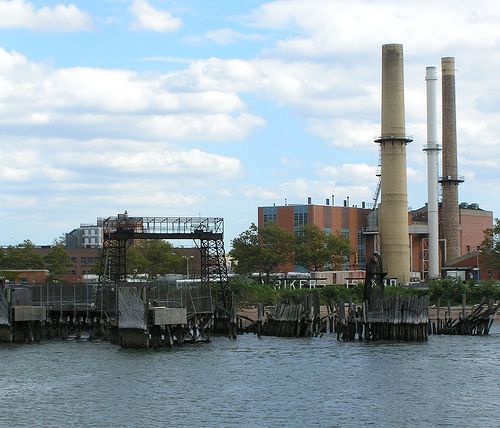When they say Rikers Island is New York City's largest jail facility, they're not kidding. It's Labor Day weekend and I'm headed to Rikers to visit Isaiah's 23-year old brother Kenje. I've never met Kenje before and feel a little worried about meeting him for the first time under these circumstances. Isaiah and his parents haven't been in contact with Kenje since his incarceration so I have to depend on Kenje's 17-year-old girlfriend Jennifer to tell him I'm coming to visit.
The bus ride over there is all gold hoops, french fries, crying babies and cell phone chatter. Groups of young women huddle together talking about what gifts they've brought their "baby's daddy" and how much longer they'll be inside. Visiting your man in jail is a full time job.
Once inside I'm corralled between various waiting areas. Sign this, stick out your tongue, walk through the metal detector, take off your shoes. By the time I sit in the grey plastic chair to wait for Kenje I'm beat. An old man sits one table over talking to what looks like his young grandson. A mother is stacking three chairs on top of each other so her little girl can have a better view of her father who is sitting behind a pane of glass. The girl looks around the room where all the other babies are sitting on their daddies' laps.
Kenje isn't the first in his family to go to jail. His cousin, Darnell, was deported back to Liberia for selling crack and a gun in Staten Island. Darnell was in Park Hill for 7 years, five of which were spent in jail.
Kenje doesn't want to follow in Darnell's footsteps, but he doesn't know how not to. He likes the flashy clothes, the bling and the fast-paced lifestyle of the drug dealers. He wants to go to school not only in outfits that the other guys can't afford, but that no one's ever seen before. Spending "two, two fifty" on an outfit for school is the norm. The only way to afford the chains, the sneakers and the hand-made clothes is to sell drugs.
The cops arrested Kenje for selling crack. He says it was marijuana. Either way his six month old baby is growing up without a daddy. Jennifer says it was Kenje — not her — that wanted the baby. I guess at this point it doesn't matter — the baby's here to stay.
The Immigration and Naturalization Service put a hold on Kenje's case so he's unable to post bail. He hasn't seen his court appointed lawyer in three months and his family doesn't come to visit. Jennifer's I.D. card expired and she can't afford a new one so she can't come to see him either. At least when he calls she tells him she loves him and that she's "mad sad" every time she looks at his picture.
Kenje says he's done living the life of a drug dealer. But it's hard. When he gets out he'll be back at square one — no money and no job. Drugs are an easy, quick way to make some fast cash. If only he could sell just enough drugs to have a nest egg he could get a job and stop forever, he says. But in the end he realizes it doesn't matter how much money he has. "It's all for nothing," Kenje reflects. "Cuz when you get in here they take it all away."
